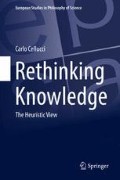Abstract
Contrary to the belief of several mathematicians that philosophy is irrelevant to mathematics, this chapter argues that philosophy is relevant to it, because it may expose the inadequacy of some basic mathematical concepts, it may provide an analysis of some basic mathematical concepts, and may help to formulate new rules of discovery. What is relevant to mathematics, however, is not classical philosophy of mathematics, which has basic limitations, but an alternative approach to the philosophy of mathematics according to which, like all other knowledge, mathematics is problem solving by the analytic method. In this perspective, the chapter argues that the aim of mathematics is not truth but plausibility, and that intuition has no role in mathematics.
Access this chapter
Tax calculation will be finalised at checkout
Purchases are for personal use only
References
Barrow, John David. 2000. Between inner space and outer space: Essays on science, art, and philosophy. Oxford: Oxford University Press.
Berkeley, George. 1948–1957. Works. London: Nelson.
Bostock, David. 2009. Philosophies of mathematics: An introduction. Oxford: Wiley-Blackwell.
Bourbaki, Nicholas. 1950. The architecture of mathematics. The American Mathematical Monthly 57 : 221–232.
Byers, William. 2007. How mathematicians think. Princeton: Princeton University Press.
Church, Alonzo. 2011. Letter to Stephen Kleene, 29 November 1935. In Appendix B to Rod Adams, An early history of recursive functions and computability: From Gödel to Turing, 223–227. Boston: Docent Press.
Cooper, William. 2001. The evolution of reason: Logic as a branch of biology. Cambridge: Cambridge University Press.
Davis, Philip J., and Reuben Hersh. 1981. The mathematical experience. Boston: Birkhäuser.
Dehaene, Stanislas. 2009. Origins of mathematical intuitions: The case of arithmetic. Annals of the New York Academy of Sciences 1156 : 232–259.
Devlin, Keith. 2005. The math instinct: Why you’re a mathematical genius (along with lobsters, birds, cats, and dogs). New York: Thunder’s Mouth Press.
Dieudonné, Jean. 2013. Mathematics – the music of reason. Berlin: Springer.
Feferman, Solomon. 1998. In the light of logic. Oxford: Oxford University Press.
Frege, Gottlob. 1960. The foundations of arithmetic: A logico-mathematical enquiry into the concept of number. New York: Harper.
———. 1967. Begriffsschrift, a formula language, modeled upon that of arithmetic, for pure thought. In From Frege to Gödel: A source book in mathematical logic, 1879–1931, ed. Jean van Heijenoort, 5–82. Cambridge: Harvard University Press.
George, Alexander, and Daniel J. Velleman. 2002. Philosophies of mathematics. Oxford: Blackwell.
Gödel, Kurt. 1986–2002. Collected works. Oxford: Oxford University Press.
Goodman, Nicolas D. 1991. Modernizing the philosophy of mathematics. Synthese 88 : 119–126.
Gowers, Timothy. 2006. Does mathematics need a philosophy? In 18 unconventional essays on the nature of mathematics, ed. Reuben Hersh, 182–200. New York: Springer.
Grabiner, Judith. 2005. The origins of Cauchy’s rigorous calculus. Mineola: Dover.
Grosholz, Emily. 2007. Representation and productive ambiguity in mathematics and the sciences. Oxford: Oxford University Press.
———. 2015. Review of Carlo Cellucci, Rethinking logic: Logic in relation to mathematics, evolution and method. Philosophia Mathematica 23 : 136–140.
Hart, Wilbur Dyre. 1996. Introduction. In The philosophy of mathematics, ed. Wilbur Dyre Hart, 1–13. Oxford: Oxford University Press.
Hersh, Reuben. 1979. Some proposals for reviving the philosophy of mathematics. Advances in Mathematics 31 : 31–50.
———. 2014. Experiencing mathematics: What do we do, when we do mathematics? Providence: American Mathematical Society.
Kitcher, Philip. 1983. The nature of mathematical knowledge. Oxford: Oxford University.
Kline, Morris. 1964. Mathematics in Western culture. Oxford: Oxford University Press.
Knorr, Wilbur Richard. 1993. The ancient tradition of geometric problems. Mineola: Dover.
Körner, Stephan. 1986. The philosophy of mathematics: An introductory essay. Mineola: Dover.
Lehman, Hugh. 1979. Introduction to the philosophy of mathematics. Oxford: Blackwell.
Locke, John. 1975. An essay concerning human understanding. Oxford: Oxford University Press.
Ó Cairbre, Fiacre. 2009. The importance of being beautiful in mathematics. IMTA Newsletter 109: 29–45.
Poincaré, Henri. 2013. The foundations of science: Science and hypothesis – The value of science – Science and method. Cambridge: Cambridge University Press.
Rodin, Andrei. 2014. Axiomatic method and category theory. Berlin: Springer.
Spelke, Elizabeth. 2011. Natural number and natural geometry. In Space, time and number in the brain, ed. Stanislas Dehaene and Elizabeth Merrit Brannon, 287–317. London: Elsevier.
Thomas, Robert. 2014. Reflections on the objectivity of mathematics. In From a heuristic point of view, ed. Cesare Cozzo, and Emiliano Ippoliti, 241–256. Newcastle upon Tyne: Cambridge Scholars Publishing.
Turing, Alan Mathison. 2001. Collected works: Mathematical logic. Amsterdam: North-Holland.
Author information
Authors and Affiliations
Rights and permissions
Copyright information
© 2017 Springer International Publishing AG
About this chapter
Cite this chapter
Cellucci, C. (2017). Mathematics as Problem Solving. In: Rethinking Knowledge. European Studies in Philosophy of Science, vol 4. Springer, Cham. https://doi.org/10.1007/978-3-319-53237-0_18
Download citation
DOI: https://doi.org/10.1007/978-3-319-53237-0_18
Published:
Publisher Name: Springer, Cham
Print ISBN: 978-3-319-53236-3
Online ISBN: 978-3-319-53237-0
eBook Packages: Religion and PhilosophyPhilosophy and Religion (R0)

